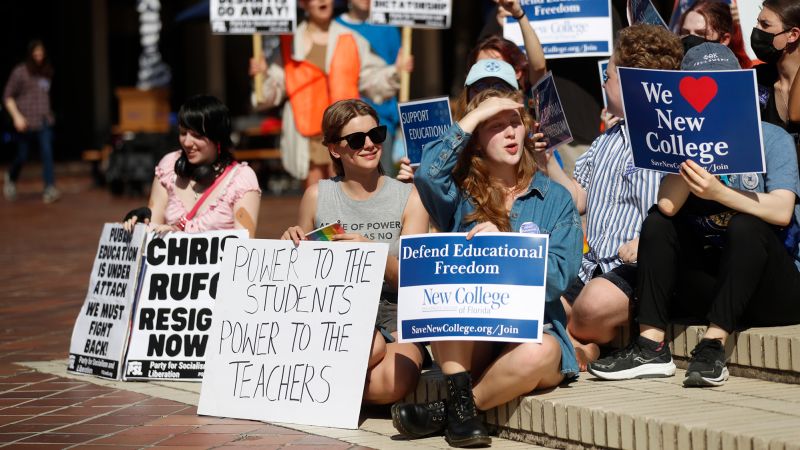
The governor proposed banning diversity and inclusion initiatives at Florida universities
Marrying the Florida Legislature: Dr. Al Sharpton, the New College of Florida, a progressive leader in diversity, equity and inclusion
Florida Gov. Ron DeSantis said Tuesday that he intends to ban state universities from spending money on diversity, equity and inclusion initiatives in hopes that they will “wither on the vine” without funding.
Diversity, equity and inclusion programs are intended to promote multiculturalism and encourage students of all races and backgrounds to feel comfortable in a campus setting, especially those from traditionally underrepresented communities. The state’s flagship school, the University of Florida, has a “Chief Diversity Officer,” a “Center for Inclusion and Multicultural Engagement” and an “Office for Accessibility and Gender Equity.”
Tuesday’s announcement was foreshadowed in December when the governor’s office asked all state universities to account for all of their spending on programs and initiatives related to diversity, equity and inclusion or critical race theory.
A new board at the New College of Florida was installed by the Republican governor, who wanted to remake the liberal arts college into his conservative vision for higher education.
One of DeSantis’ new board members, Eddie Speir, wrote in an online post that he planned to propose in that meeting “terminating all contracts for faculty, staff and administration” of the school, “and immediately rehiring those faculty, staff and administration who fit in the new financial and business model.”
At a news conference last month, the former governor said that it was a political agenda. “That’s the wrong side of the line for Florida standards. We do not think that kids should have an agenda imposed on them when you use Black history to argue for queer theories, you obviously want to use that for political purposes.
Hundreds of marchers, led by the Rev. Al Sharpton and other activists, held a rally outside Florida’s state Capitol on Wednesday to protest Republican Gov. Ron DeSantis’ administration’s rejection of a new Advanced Placement course on African American studies.
If you studied history long enough, you would know to mess with us in education, said Sharpton in a speech at the march.
Our children need to know how bad you were but also how strong you are. From the back of the bus, a group fought their way to the front of the White House.
The crowd included members of the LGBTQ, Native American and Latinx communities, said Sharpton, noting that they are all marching together. You should not have been with us. Now you have brought us all together.”
The marchers chanted slogans like, “Hey, hey, ho, ho, Ron DeSantis has got to go!” and “I’m Black and I’m proud!” Some carried signs with messages such as “Save our history” and “We will not be silenced.”
Simmons was a former teacher at the march and she said it was a “gross injustice” that the state rejected the new course.
Simmons said that black history is important to everyone. It is the fabric of the nation. angst in our community is caused by the fact that we try to wipe it away or diminish its importance. The AP course is not the only one. It is the whitewashing of African American history in this country. African Americans are treated differently in educational institutions than people of other races.
“It’s ridiculous that they’re not letting this one AP class be thought,” said her daughter, Izzy Cummings. “It affects us directly. If we can’t learn about the past, it will change our future.
The College Board also admitted it “made mistakes in the rollout” of the course framework “that are being exploited,” according to a lengthy statement published Saturday. The board felt that Florida officials had characterized their dialogue and influence with the testing non-profit in a questionable way.
The testing organization behind the new course last weekend accused the state Education Department of “slander” and spreading misinformation about it for political gain.
The framework of the new Advanced Placement course, on African American studies, was released by the College Board earlier in the month, with many of the topics objected to removed.
The Palm Beach Atlantic University ‘Professor Racial Justice Unit’: Comment on Joeckel’s “Indoctrination”
An English professor at Florida’s Palm Beach Atlantic University said his job is under review after he was told he is “indoctrinating” students.
Joeckel said he has taught a unit about racial justice in his classes for many years without any problems until Wednesday when the dean and provost demanded a private discussion at the end of the class.
They told me that they had concerns about me indoctriating students. “Indoctrinating” was the exact word they used, Joeckel said. I didn’t know this was coming.
CNN asked about the school but Palm Beach Atlantic University didn’t reply. A university spokesman told WPBF that they can not comment on a personnel matter.
The handbook for the employees of the private Christian university says that dismissals may happen at any time without cause. The institution does not offer tenure, the review process for employment decisions regarding senior faculty that is meant to safeguard academic freedom.
Source: https://www.cnn.com/2023/02/18/us/palm-beach-atlantic-university-professor-racial-justice-unit/index.html
A Conversation with Joeckel: Fighting for First Amendment Right and First Amendment Fundamental Principles on State Colleges and Universities in the U.S.
A number of students came to Joeckel’s defense online. Lauren Carleton, who graduated in May, told CNN she had taken two of Joeckel’s classes and didn’t feel she was being pressured to think a certain way.
“He is open-minded, and never wants to push his agenda on students; he pushes students to be critical thinkers and open-minded. She said that was her experience.
The review of Joeckel’s employment comes as Florida Gov. Ron DeSantis, a Republican, has proposed plans to defund all diversity, equity and inclusion programs at state colleges and universities in Florida. The administration rejected the Advanced Placement African American studies course.
“Of course I can’t say with certainty the connection, but things like this do not happen in a vacuum. What happened to me is definitely influenced by a toxic political culture, and it’s my opinion that the university is playing a role,” Joeckel said.
As recently as 2019, DeSantis styled himself as a First Amendment defender. During his first gubernatorial run in 2018 he pledged on his campaign web site to defend “First Amendment speech rights against those in academia, media and politics who seek to silence conservatives.”
Leadership will be needed to escape this escalating battle of assaults on speech. University presidents need to stand up and insist, and ensure, that all viewpoints – left and right alike – get a fair hearing on campus. They need to resist legislation that threatens academic freedom and micromanages curriculum.
DeSantis is not wrong to point out that progressive orthodoxies can sometimes stifle opposing views. For a principle to be a principle, it has to be extended to all and that is what DeSantis wants to do with free speech protections.
Indeed, in pushing back against what he decries as wokeness run amok, DeSantis has embraced the very tactics he once decried, putting the weight of government power behind efforts to repress viewpoints that offend him and his supporters.
The costs of raising questions that are too high should be avoided through approaches such as demonization and stigmatization. Conservatives need to reject an approach that has out-and-out government censorship. Florida education officials ought to teach college administrators and principals to keep a classroom open to all ideas instead of responding to the exclusion of views that they do not agree with.
The new visibility and appreciation of transgender and non-binary identities and rights has raised important questions about pronouns, bathrooms, sports and the autonomy of adolescents. The 2020 murder of George Floyd spurred schools, colleges and companies to take new steps aimed to root out the entrenched, stubborn legacy of racism in their institutions. Positive developments are vital to bring about a more equal society.
Efforts to promote equity are cross over into censoriousness. Just last week Roald Dahl’s publisher announced plans to scrub beloved works like “Charlie and the Chocolate Factory” and “Matilda” of references that could be construed as offensive to the overweight, wig-wearers or people with horse-like features. In 2015, a student performance of “The Vagina Monologues” by Eve Ensler (now known as V) was cancelled on the basis that the play itself was transphobic because the script failed to acknowledge that not all women have vaginas.
Some curricula and programs dismiss the questions and perspectives of people of color as a result of racism, which can be construed as being beyond the pale.
In a highly publicized incident at the University of Central Florida in 2020, Professor Charles Negy was fired after his tweets about “Black privilege” prompted campus protests. While the university claimed he was guilty of misconduct, an arbitrator found no just cause for his determination and ordered him reinstated. The incident seemed to form part of a broader pattern at the University.
A group of students at the school believe that the college will no longer be a safe place to attend due to its close proximity to the LGBTQ community. Students walked out of class last week to protest against the leadership changes on the campus.
The bill, filed by a Republican lawmaker last week, would put board of trustee members in charge of faculty hiring; defund diversity, equity and inclusion programs; eliminate majors or minors related to critical race theory or gender studies; and authorize boards of trustees to review tenure of faculty.
General education courses in state colleges and universities would have to promote the values necessary to preserve the constitutional republic and could not define American history as contrary to the creation of a new nation based on universal principles, according to the legislation filed this week. It would prohibit general courses “with a curriculum based on unproven, theoretical or exploratory content.”
to make hiring, firing and post-tenure review determinations, making it impossible for faculty to critique any policy or challenge any position that runs counter to that of state officials. The core of academic freedom that has made us the envy of the world is targeted by Hbb 970. If passed this bill will sound the death knell for higher education in Florida.
Students and faculty at the New College of Florida are planning to demonstrate during a board of trustees meeting Tuesday after Gov. Ron DeSantis launched a conservative takeover of the small public liberal arts college.
In January, Christopher Rufo and six other board members of the college were replaced with conservative allies by DeSantis, who has been against critical race theory. The interim president of the college was appointed by the new board. Corcoran will earn a base salary of $699,000.
The New College of Florida in Sarasota has seen a decline in students and now focuses too much on diversity, inclusion, and critical race theory.
Leffler said New College of Florida has always been a school that has encouraged “free academic thought.” He said that lawmakers want to remove freedom by telling students what is and isn’t allowed.
The bill was praised by Rufo, who said on Twitter that it restores the “principle of colorblind equality in higher ed.” The Manhattan Institute has a senior fellow called Rufo that is director of the initiative on critical race theory.
D.E.I. Can Erode Academic Freedom. Let’s Not Pretend Otherwise: The Case of Florida Universities and Colleges
The president of the American Association of University Professors told CNN earlier this month that people who are seeking a graduate degree might choose to attend schools in other states that support academic freedom.
“The consequences for students are enormous,” Mulvey said. “They are denied the opportunity to learn and grow, students are denied the opportunity to hear important perspectives. That’s the real tragedy.”
Amna Khalid, a history professor at Carleton College in Minnesota, has written extensively in the Chronicle of Higher Education and other publications on such subjects as “Yes, D.E.I. Can Erode Academic Freedom. Let’s Not Pretend Otherwise” and “The Data Is In — Trigger Warnings Don’t Work.”
there is a vast and growing literature showing that existing D.E.I. programming used in many schools and corporations is not just ineffective, it’s actually pernicious. It demoralizes people, reduces trust and increases hostility.
What is the main complaint of DeSantis et al. Knowledge being produced isn’t unreliable or students aren’t getting good jobs. No. They don’t like that institutions seem to bolster the cultural and political power of their rivals. They would like to use these institutions to their own advantage. They’re not committed to academic freedom.
prevent teachers from discussing certain areas of research, or force them to toe particular lines, or drive them toward self-censorship, or weaken tenure protections. These are moves that don’t enhance academic freedom. They don’t care about academic freedom. They are worried about power.
Florida’s public universities and colleges are grounded in the history and philosophy of Western Civilization, prohibiting D.E.I., and other discrimination.

